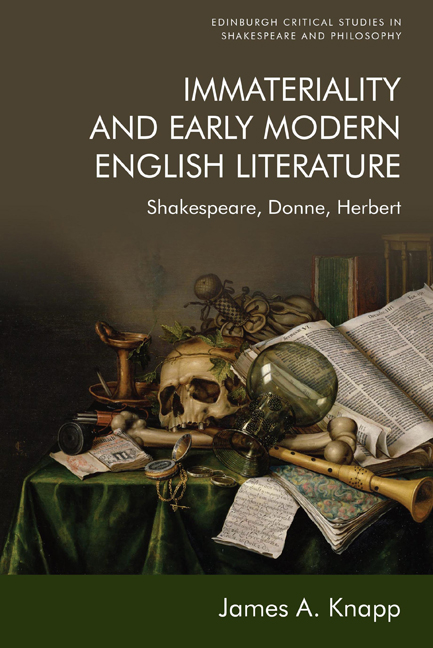9 - ‘Thinking makes it so’: Mind, Body and Spirit in The Rape of Lucrece, Hamlet and Much Ado About Nothing
Published online by Cambridge University Press: 10 October 2020
Summary
The soule indeede is so diuine, that raising and mounting itself sometimes aboue all natural formes, it comprehendeth by an admirable, absolutely free, and incompulsiue power, all incorporeall things seuered and divided from all matter and substance.
Helkiah Crooke, MicrocosmographiaThe justification for Claudio's infamous rejection of Hero at the altar in Much Ado About Nothing raises an epistemological problem that Shakespeare returned to often: the gap between perception and knowledge, particularly the knowledge of another person. Claudio declares, ‘Oh, what authority and show of truth / Can cunning sin cover itself withal!’ before going on to charge that despite her ‘exterior shows’, Hero ‘knows the heat of a luxurious bed; / Her blush is guiltiness not modesty’ (4.1.34–5, 39–41). Claudio then draws attention to the signifying power of Hero's ‘seemingly’ guiltless face, only to emphasise that her appearance does not reflect her inner character:
Out on thee seeming! I will write against it:
You seem to me as Dian in her orb,
As chaste as is the bud ere it be blown;
But you are more intemperate in your blood
Than Venus, or those pamp’red animals
That rage in savage sensuality. (4.1.55–9)
A principal irony in the scene is the fact that Claudio's certainty – that he knows the truth about Hero's character – is a product of his own eyes, the very evidence he rejects in the process of Hero's public shaming. Even more telling, perhaps, is that he is willing to draw attention to Hero's ambiguous appearance in support of his claim: ‘Behold how like a maid she blushes here! / Oh, what authority and show of truth/ Can cunning sin cover itself withal’ (4.1.33–5). Unlike Hamlet who is as he seems despite his suggestion that the two are not necessarily connected, Claudio is certain that Hero is not what she seems: ‘Would you not swear, / All you that see her, that she were a maid / By these exterior shows? But she is none … her blush is guiltiness, not modesty’ (4.1.37–9, 41). Later in the scene, Friar Francis will also point to Hero's appearance, but he will do so to make his case for her innocence.
- Type
- Chapter
- Information
- Immateriality and Early Modern English LiteratureShakespeare, Donne, Herbert, pp. 320 - 357Publisher: Edinburgh University PressPrint publication year: 2020



